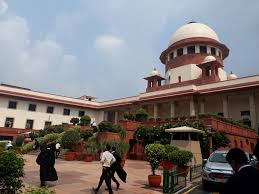Land Acquisition Act, 1894, Section 4, 6 and 23 – Land acquisition – Market value –Held that a batch of cases has been remanded by this Court for reconsideration by the High Court and that those matters pertain to the same broader acquisition, though they possibly pertain to different projects – In a peculiar situation where some of the judgments of the High Court attained finality as the compensation amount, as enhanced, stands paid whereas the others are still subject matter of adjudication, deem it appropriate to remand these cases also to the High Court so that a holistic view pertaining to the subject acquisition, at least project wise, can be taken by the High Court – High Court will make an endeavour to infuse uniformity in the matter of award of compensation, to the extent it is possible, in accordance with law – High Court, while undertaking this exercise, will not reduce the compensation to a rate which has already been paid to some of the land owners and which has attained finality – The rest of the contentions from both sides are kept open to be gone into by the High Court -Parties directed to appear before the High Court of Karnataka at Kalaburagi Bench on 18.03.2024. (Para 14 to 17)
Advocate(s): Mr. Naveen R. Nath, Sr. Advocate, Ms. Hetu Arora Sethi, Advocate, Mr. Abhimanyu Verma, Advocate, Ms. Lalit Mohini Bhat, Advocate, Ms. Disha Gupta, Advocate, Ms. Hetu Arora Sethi, Advocate, for the Appellant;
Mr. Anand Sanjay M Nuli, Sr. Advocate, Mr. Suraj Kaushik, Advocate, Mr. Agam Sharma, Advocate, Mr. Nanda Kumar, Advocate, Mr. Dharm Singh, Advocate, M/s. Nuli & Nuli, Advocates, Mrs. Kiran Suri, Sr. Advocate, Mr. Sharanagouda Patil, Advocate, Mr. Harshvardhan Malipatil, Advocate, Mr. Jyotish Pandey, Advocate, Ms. Supreeta Sharanagouda, Advocate, Mr. S. J. Amith, Advocate, Mrs. S. Anuradha Bhat, Advocate, Mr. Harisha S.R., Advocate, for the Respondent.
SUPREME COURT OF INDIA
2024 STPL(Web) 203 SC
[2024 INSC 208]
Executive Engineer, Knnl Vs. Subhashchandra And Others
Civil Appeal No. 4053 of 2024 (Arising out of SLP (Civil) No.13065 of 2022) with Civil Appeal No. …. of 2024 (Arising out of SLP(Civil) No. 9897 of 2022); Civil Appeal No. …. of 2024 (Arising out of SLP(Civil) No. 10982 of 2022); Civil Appeal No. …. of 2024 (Arising out of SLP(Civil) No. 14054 of 2022); Civil Appeal No. …. of 2024 (Arising out of SLP(Civil) No. 13826 of 2022); Civil Appeal No. …. of 2024 (Arising out of SLP(Civil) No. 13864 of 2022); Civil Appeal No. …. of 2024 (Arising out of SLP(Civil) No. 14053 of 2022); Civil Appeal No. …. of 2024 (Arising out of SLP(Civil) No. 14055 of 2022); Civil Appeal No. …. of 2024 (Arising out of SLP(C) No. 13876 of 2022); Civil Appeal No. …. of 2024 (Arising out of SLP(C) No. 14048 of 2022); Civil Appeal No. …. of 2024 (Arising out of SLP(C) No. 13950 of 2022); Civil Appeal No. …. of 2024 (Arising out of SLP(C) No. 13948 of 2022); Civil Appeal No. …. of 2024 (Arising out of SLP(C) No. 13827 of 2022); Civil Appeal No. …. of 2024 (Arising out of SLP(C) No. 14045 of 2022); Civil Appeal No. …. of 2024 (Arising out of SLP(C) No. 13949 of 2022); Civil Appeal No. …. of 2024 (Arising out of SLP(C) No. 13859 of 2022)’ Civil Appeal No. …. of 2024 (Arising out of SLP(C) No. 13873 of 2022); Civil Appeal No. …. of 2024 (Arising out of SLP(C) No. 13877 of 2022); Civil Appeal No. …. of 2024 (Arising out of SLP(C) No. 11398 of 2022); Civil Appeal No. …. of 2024 (Arising out of SLP(C) No. 10980 of 2022); Civil Appeal No. …. of 2024 (Arising out of SLP(C) No. 10007 of 2022)’ Civil Appeal No. …. of 2024 (Arising out of SLP(C) No. 10176 of 2022); Civil Appeal No. …. of 2024 (Arising out of SLP(C) No. 9860 of 2022); Civil Appeal No. …. of 2024 (Arising out of SLP(C) No. 11163 of 2022); Civil Appeal No. …. of 2024; (Arising out of SLP(C) No. 10570 of 2022); Civil Appeal No. …. of 2024 (Arising out of SLP(C) No. 11170 of 2022); Civil Appeal No. …. of 2024 (Arising out of SLP(C) No. 14052 of 2022); Civil Appeal No. …. of 2024 (Arising out of SLP(C) No. 14046 of 2022); Civil Appeal No. …. of 2024 (Arising out of SLP(C) No. 13825 of 2022);Civil Appeal No. …. of 2024 (Arising out of SLP(C) No. 14050 of 2022); Civil Appeal No. …. of 2024 (Arising out of SLP(C) No. 12949 of 2022); Civil Appeal No. …. of 2024 (Arising out of SLP(C) No. 13947 of 2022); Civil Appeal No. …. of 2024 (Arising out of SLP(C) No. 10081 of 2022); Civil Appeal No. …. of 2024 (Arising out of SLP(C) No. 10014 of 2022); Civil Appeal No. …. of 2024 (Arising out of SLP(C) No. 2284 of 2023); Civil Appeal No. …. of 2024 (Arising out of SLP(C) No. of 2024) [Diary No(s).12213 of 2023] and Civil Appeal No. …. of 2024 (Arising out of SLP(C) No. of 2024) [Diary No(s).13231 of 2023]-Decided on 12-03-2024
https://stpllaw.in/wp-content/uploads/2024/04/2024-STPLWeb-203-SC.pdf







